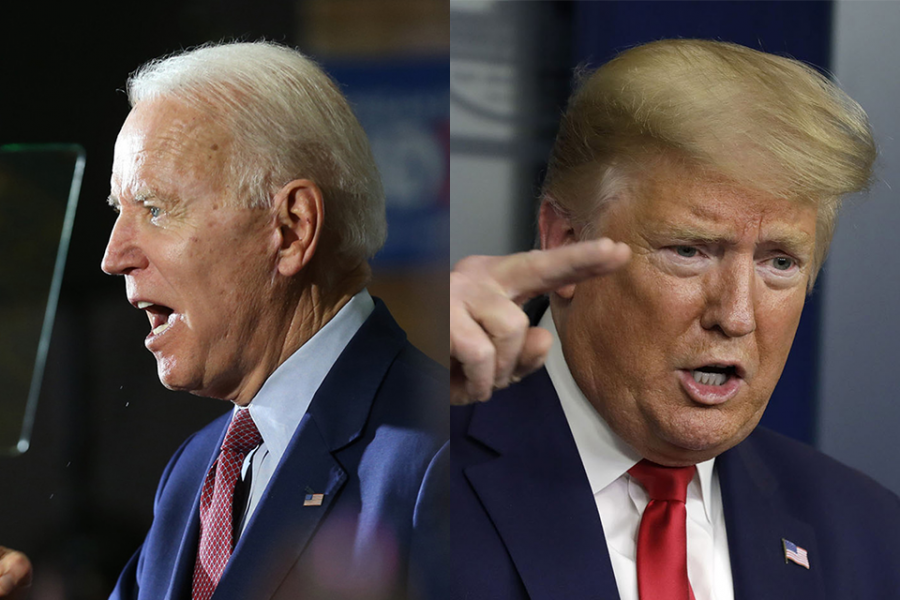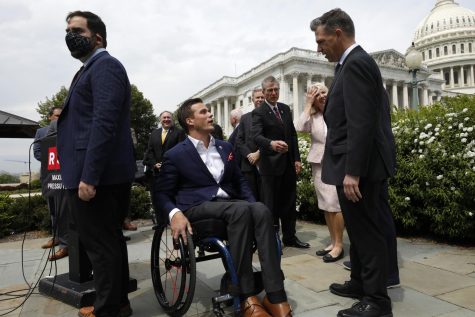OPINION: A dirty rock and a skeevy hard place. How do you vote between allegedly immoral people?
In March, former Joe Biden-staffer Tara Reade accused the presidential candidate of sexually assaulting her back in 1993. Reade’s former neighbor, Lynda LaCasse, has corroborated this story, saying she heard it years ago. Many outlets have deemed LaCasse a credible source on this matter, and because of this story making the rounds, the Republican party has had a field day.
While this looks bad for the Democratic side, many commentators on the left have been quick to point out that President Donald Trump himself has dozens of accusations out there regarding sexual assault and rape.
Though there is a point to this defense, it does not absolve Biden of the alleged wrongs. In fact, all this finger-pointing has done is bring up a new question: How do we, the voters, choose between two men that might just be morally corrupt?
Of course, the question does not just revolve around two people. There have been innumerable cases of politicians in exactly these types of situations, from former President Bill Clinton to Associate Justice of the Supreme Court Brett Kavanaugh.
What is the result of these allegations? Their names getting dragged through the mud can tarnish their reputation, but the power rarely takes a dip. Kavanaugh has his job; Clinton and Trump got impeached (though Trump’s was unrelated), but Clinton still sat through eight full years of presidency and Trump has a shot at doing the same.
And just when people start to think that Biden will be their savior from this outcome, he joins the list of all of the political figures who have been branded as alleged predators in the public eye.
Veronica Wernicke, the assistant opinion section editor at The Seahawk, says she is disappointed that these are the two candidates that we are left with in light of recent events.
“I wish the allegations had come out sooner when more candidates were still in the running,” Wernicke wrote. “Maybe things would have turned out differently, and there would have been more time before primaries to see if they were true or not. More than ever it will be important to look at each candidate’s policies and views on the issues you care about the most to make the best-informed decision. As a woman, it is especially frustrating that even in 2020 we are still having issues regarding sexual assault and letting people who have done such vile things get as far as they do in terms of power. I had planned on voting one way in November, but these allegations definitely have me second-guessing my options.”
If one wants to dive into specifics, sure, there are more candidates at the plate than just Biden and Trump when third-party runners are included. For many, however, this election is no longer about voting for the candidate that fits their ideals best, a la voting for the Green or Tea Party if their views align with them.
Instead, Trump’s presidency has amplified the idea that voting means siding with the lesser of two evils. In this scenario, if a voter does not vote for the Big Two party that fits them best (e.g. a socialist voting for the democrat), the other party’s win (in this case a republican candidate taking office) could be seen as a bigger loss for them.
This is an unfortunate spot to find oneself in, as it does feel like a restriction of the democracy-based freedoms that this country prides itself on, but it is a reality for many voters. However, Wernicke is one voter who believes that third-party voting is not the big bad option that others paint it as.
“I have never had a problem voting for third party candidates, especially if my political views align better with them than say the democrat or republican nominee,” Wernicke explains. “I know a lot of people get up in arms about voting for a third-party candidate, but at the end of the day it is your vote, and you have got to vote for someone you believe in. In 2020 a third-party candidate might just be the better option, especially if they do not have any sexual assault allegations against them.”
The problem of supporting morally corrupt people extends far past politics. It can be found in the entertainment industry and especially the music industry, with examples like fans struggling to part with the music of R-Kelly (who allegedly takes advantage of underage girls) and Chris Brown (who not-so-allegedly assaulted then-girlfriend Rihanna).
At the end of the day, the president should be the person who will run this country the best. It is just a shame that the most-accepted options we have at present are potentially bad people.










Lisa Hepler • May 5, 2020 at 12:36 pm
I think we are all morally corrupt on some level and the reality is that election campaigns have been dragging people through the mud since before Thomas Jefferson ran for president. The real problem here is getting to the actual truth and sorting out the facts. We are a generation who relies more on social media for news than finding the truth. That is the problem. We need to work harder to get the facts and base our opinions and choices on facts.